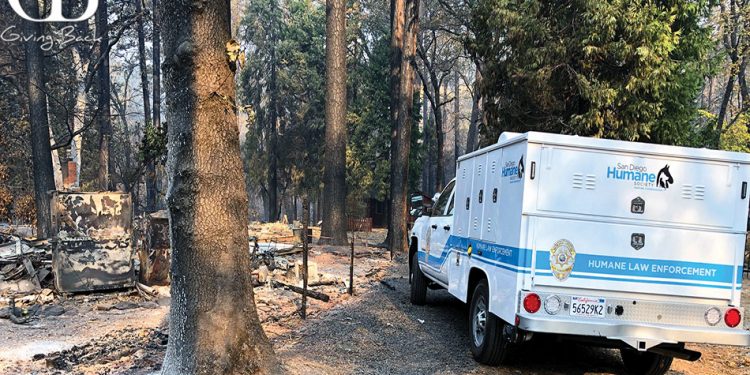Prepping You and Your Pets for Disasters

While we may not know when a disaster will strike – whether it is an illness, wildfire, earthquake or other event – we can plan ahead to care for ourselves and our pets. During wildfire season, San Diego Humane Society reminds you to include your animals in your emergency plans. Here are a few important tips:
1. Plan Ahead. Not all evacuation shelters accept pets, so do some prep work on County information sources such as ReadySanDiego.org and ListoSanDiego.org (Spanish).
2. In Case of Illness. Create a care tree to determine who will be there for your pets in case you become sick or hospitalized.
3. Identification. Make sure your pets are wearing identification at all times. This includes animals who do not normally go outside. Having your pets microchipped can also help identify them if they become lost.
4. Leave Early and Take Your Pets. If you are evacuating your home, take your pets with you. Pets cannot fend for themselves during disasters and leaving them behind can risk both their lives and those of rescuers. Leave early and don’t wait for mandatory evacuation orders.
5. In Case You Are Away. A disaster may strike when you are away from home. Make arrangements in advance with a trusted neighbor to take your pets and meet you at a specified location.
6. Plan for Large Animals. If you have large animals such as livestock, have trailers or travel containers available. Work with neighbors to identify locations where large animals can be brought to on foot (in the case of fire, large open areas).
7. Prepare an Emergency Kit. Put all of your daily pet supplies in a sturdy container. Gather three-plus days of food and water with bowls and two weeks of your pet’s medications. Don’t forget shot records, crates, bedding and even toys.
8. Register with Finding Rover. Register your dog or cat with Finding Rover, an app that uses facial recognition to reunite lost pets with their owners.
9. Learn Pet First-Aid. The last thing you want is to be frazzled if your pet is injured. Spare yourself (and your pet) the panic by familiarizing yourself with what to do should your pet ever become injured.
10. Know Your Vet. Locate a veterinarian or animal hospital in the area where you may be seeking temporary shelter.
Keeping your pets comfortable will reduce stress during an evacuation. Remember, your animals rely on you to help them escape. The more prepared you are, the safer you and your pets will be!
More helpful tips and resources can be found at www.sdhumane.org/disasterpreparedness.





